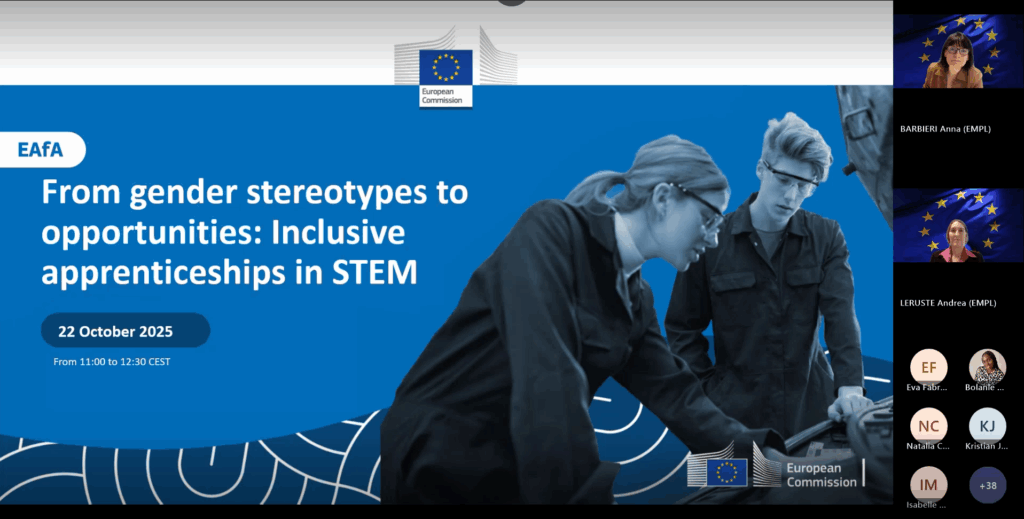EAFA Webinar: From Gender Stereotypes to Opportunities – Inclusive Apprenticeships in STEM
23/10/2025

On 22 October, EARLALL joined EAfA’s webinar on inclusive apprenticeships in STEM, highlighting the crucial role of lifelong learning and apprenticeships in promoting diversity and advancing Europe’s skills agenda.
Addressing gender stereotypes and unlocking talent
Opening the session, Anna Barbieri (DG EMPL) highlighted EAfA’s mission to enhance the quality and image of apprenticeships in the EU. Andrea Leruste from the European Commission emphasized that gender stereotypes still limit women’s participation in STEM, leading to missed innovation opportunities. She underlined that inclusive apprenticeships can help unlock talent and support the EU’s Union of Skills initiative.
Best practices from across Europe
The second part of the webinar featured elevator pitches showcasing best practices for gender inclusion in apprenticeships.
Charlotte Otten (SolarPower Europe) presented their gender equality strategy, highlighting actions like inclusive hiring, mentoring, and visibility for success stories, which led to a 50% gender balance in their workforce. Aidan Kenny (Technological University Dublin) discussed Ireland’s progress in developing apprenticeship consortia and the need to address social and economic barriers limiting women’s access to STEM programmes. Kristian Jensen (Boss Ladies) shared efforts to support women and minorities in male-dominated fields through mentorship, storytelling, and community building to foster lasting cultural change in STEM.
Research and EU initiatives driving change
The third segment offered an evidence-based view on gender in STEM.
Isabelle Le Mouillour (BIBB) presented research showing that women remain underrepresented in STEM apprenticeships and highlighted the need for inclusive classroom environments and diverse role models. Natalia Molina Calavita (EIT RawMaterials) introduced the Girls Go STEM initiative, which has empowered over 70,000 girls across Europe with digital and green skills and now aims to reach 100,000. Eva Fabry (ECWT) shared efforts to advance gender equality in VET through mentoring and open resources that have supported 38,000 young women, calling for long-term, systemic action to make diversity and inclusion a lasting driver of innovation.
Key takeaways and way forward
A closing poll asked participants what they believed to be the main barrier to gender balance in apprenticeships. Nearly half (49%) identified cultural stereotypes and bias, followed by company practices and recruitment policies (19%), family or societal expectations (15%) and lack of role models (11%).
The discussion concluded with a shared understanding that apprenticeships sit at the crossroads of education and employment, offering a powerful platform to tackle inequality while meeting Europe’s evolving skills needs. Through collaboration across sectors, from education and research to business and policy, the EU continues to promote inclusive apprenticeship pathways that close the gender gap and strengthen Europe’s talent base for the green and digital transitions.
EARLALL’s ongoing commitment
EARLALL is leading the EAfA Community of Practice on the role of regions and cities in promoting apprenticeships, showcasing how local and regional authorities can build stronger apprenticeship systems and support skills development across Europe.
In this context, EARLALL also promotes initiatives such as the QUEEN project – Quality Apprenticeships for Evolving Labour Needs, which empowers youth and adults through high-quality apprenticeships that adapt to changing labour markets and foster inclusive, sustainable career pathways for all.
EARLALL’s Working Groups on Skills and the Labour Market and Youth Policies continue to follow the EAfA agenda, working to strengthen the quality, inclusiveness, and attractiveness of apprenticeships across European regions.

